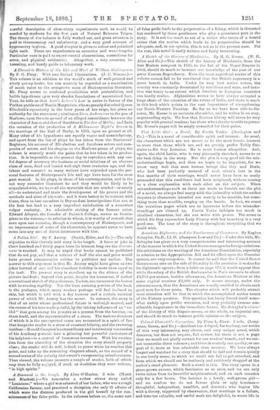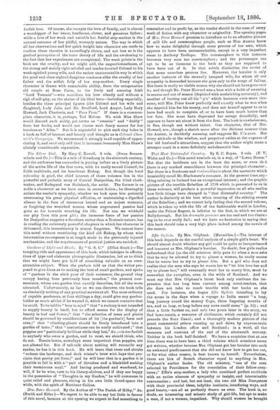Colonel Cheswick's Campaign. By Flora L. Shaw. 3 vols. (Long-
mans, Green, and Co.) —Accident has delayed, far too long, our notice of this very interesting, very clever, and very unique novel, which deserves, but does not require, full review, for there is not a page that we would not gladly extract for our readers' benefit, and we can- not transcribe three volumes ; and there is scarcely one quality, or one part of it, more or less admirable than another. We have always longed and watched for a story that should be laid and remain quietly in one lovely scene, to which we could not fail to get attached, and from which we should not be restlessly and ruthlessly dragged at the author's cruel pleasure. Such a novel is this. The story opens in a grass-grown avenue, which fascinates us at once, and we are only twice taken from its beautiful neighbourhood, and on each occasion only for a few hours. The heroine is a lovely, well-grown girl— and we confess we do not favour plain or ugly heroines— thoughtful, independent, unselfish, and devoted ; who begins life with a theory, suggested by observation, that marriage is a failure, and time too valuable, and useful work too delightful, to waste life in
foolish love. Of course, she excepts the love of family, and is almost a worshipper of her brave, handsome, clever, and generous father ; while a love of her weak and amiable but fretful step-mother is the natural outcome of her pitiful, womanly nature. The way in which all her observations and her quick insight into character are made to confirm these theories is exceedingly clever, and not less so is the gradual perception of the truer theory of life and the awakening to the fact that her experiences are exceptional. The weak points in the book are the cruelty, and we might add, the ungentlemanliness, of the strong and mainly right-minded and tender-hearted Colonel to his weak-spirited young wife, and the rather unaccountable way in which the good and clear-sighted daughter condones alike the cruelty of her father and the selfish folly of her step-mother. Every single character is drawn with remarkable ability, from the octogenarian old couple at Rose Farm, to the lively and amusing Irish "Lord Tommie"—who sacrifices his love silently and without a sigh of self-pity, on the shrine of his ideal hero—including especially, besides the three principal figures (the Colonel and his wife and daughter), Lady Julia and Mr. Bradford, Lord Amyot, Lady Mary Howard, Jack Charteris, and " Froa Frou." If there is a common- place character, it is, perhaps, Ted Mohnn. We wish Miss Shaw would discard such sickly, pet terms as "sweetie" and " daddy " from her books, and would not choose such fancy names for her heroines as " Ailsa." But it is ungrateful to pick such tiny holes in a book so full of interest and beauty and thought as is Colonel Ches- wick's Campaign. We recommend it strongly to all capable of appre- ciating it, and need only add that it increases immensely Miss Shaw's already considerable reputation.



































 Previous page
Previous page